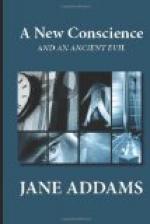When the legal control of commercialized vice is thus tied up with city politics the functions of the police become legislative, executive and judicial in regard to street solicitation: in a sense they also have power of license, for it lies with them to determine the number of women who are allowed to ply their trade upon the street. Some of these women are young earthlings, as it were, hoping to earn money for much-desired clothing or pleasure. Others are desperate creatures making one last effort before they enter a public hospital to face a miserable end; but by far the larger number are sent out under the protection of the men who profit by their earnings, or they are utilized to secure patronage for disreputable houses. The police regard the latter “as regular,” and while no authoritative order is ever given, the patrolman understands that they are protected. On the other hand, “the straggler” is liable to be arrested by any officer who chooses, and she is subjected to a fine upon his unsupported word. In either case the police regard all such women as literally “abandoned,” deprived of ordinary rights, obliged to live in specified residences, and liable to have their personal liberties invaded in a way that no other class of citizens would tolerate.
The recent establishment of the Night Court in New York registers an advance in regard to the treatment of these wretched women. Not only does the public gradually become cognizant of the treatment accorded them, but some attempt at discrimination is made between the first offenders and those hardened by long practice in that most hideous of occupations. Furthermore, an adult probation system is gradually being substituted for the system of fines which at present are levied in such wise as to virtually constitute a license and a partnership with the police department.
While American cities cannot be said to have adopted a policy either of suppression or one of regulation, because the police consider the former impracticable and the latter intolerable to public opinion, we may perhaps claim for America a little more humanity in its dealing with this class of women, a little less ruthlessness than that exhibited by the continental cities where regimentation is relentlessly assumed.
The suggestive presence of such women on the streets is perhaps one of the most demoralizing influences to be found in a large city, and such vigorous efforts as were recently made by a former chief of police in Chicago when he successfully cleared the streets of their presence, demonstrates that legal suppression is possible. At least this obvious temptation to young men and boys who are idly walking the streets might be avoided, for in an old formula one such woman “has cast down many wounded; yea, many strong men have been slain by her.” Were the streets kept clear, many young girls would be spared familiar knowledge that such a method of earning money is open to them. I have personally known several instances




